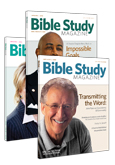How Bible Study Changed My Life and Saved My Marriage

David Lawson and his wife's marriage was in serious trouble. So, while his wife B.J. was out of town visiting a relative, he visited a church. That Sunday morning, he gave his life to Christ."
I didn't know what being a Christian was all about," says Lawson. "I just felt this incredible question burning in my heart: 'What do I do now that I'm a Christian?'"
Right at the beginning of his new faith journey, David says there were two things he knew for sure. First, even though his marriage was on the rocks, a divorce was out of the question. And second, having come to faith in Christ under the preaching of a Bible-saturated church, he thought, "If God wrote the Bible, I should probably read it!"
While he could not have known it at that moment, this insightful instinct was the first step toward an entirely new career and calling, as well as a restored marriage. A police officer at the time of his conversion, Lawson quickly developed a strong passion for Bible study—a passion he soon shared with his wife, B.J., who became a believer six weeks later.
"From the moment she became a Christian, both of us had a strong desire to understand what the Bible said." Because of Lawson's job, he was unable to join a weekly Bible study at first; however, B.J. joined a Precept study a few months after their conversion. "I was so jealous," Lawson admits. "She was studying and learning what the Bible said in a way that made sense to her."
Observing the study techniques his wife had learned from Precept, which included using different colored pencils and symbols to help her better understand the biblical text, Lawson began asking questions.
"I aggravated that poor woman to death! I would stand over her shoulder and ask her what she was doing, and why she wrote this and why she drew that. She was trying to concentrate, and my questions became very frustrating for her!" The Lawsons finally came to an agreement. "She would do her homework without me bugging her, and then when she was finished, I could read through it." For four months, B.J. shared her notes with her husband until an evening class provided them both with the opportunity to attend a Bible study. Lawson says that their newfound, shared passion for studying Scripture played a huge role in saving their marriage.
Today, David and B.J. Lawson are authors with Precept Ministries (Precept.org), writing Bible studies and traveling all over the world to speak about the Scriptures and equip believers to study on their own. During a conference in Wisconsin, David Lawson took some time to speak with Bible Study Magazine about his work with one of the top Bible study resources in the world, how he keeps his own fire burning, and which Bible study resources he can't live without.
The mission of Precept Ministries is to see people established in God's Word, specifically through Bible study using what Precept calls "the inductive method." Rather than offering one person's reflections and interpretations, Precept studies challenge students to observe, interpret and find practical applications from the Scriptures on their own (and in group settings) through careful, word-by-word study.
"I've noticed that many Bible studies are written by people who are passionate about God and write studies to tell other people what they've learned about Him," says Lawson. "However, one of the problems with that is that it puts my personal relationship with the lord in the hands of a middle-man. I can easily become dependent upon what others have learned about God, and not be in that personal relationship myself. At Precept, our hope is not that the church would do away with personal, interpretive Bible studies done by various Bible teachers, but rather that those would become secondary sources, with the primary source being a personal study of the Word of God, so folks can differentiate what someone else has learned from what they have discovered themselves."
To emphasize his point, Lawson shared a favorite illustration. "My study of the Word is the meat and potatoes of life—it is what grows and nourishes me. Other studies, the ones that talk about people's personal experiences with God, are more like spices. I need the nourishment that comes from studying the actual texts … the studies of other people add extra flavor to that substance. Precept Ministries' passion is to get you into the heart of the substance. We want you to explore Scripture for yourself, then enjoy the spice of reading what others have to say about their own studies."
This "meat and potatoes" approach provides consistent nourishment for Lawson, but what happens during the inevitable seasons of spiritual famine? Maintaining a personal relationship with Christ and a fresh approach to God's Word is a struggle that many pastors and ministry leaders face. How does this professional Bible teacher keep his own cup filled?
"I see that problem in others and I wrestle with it myself. Mostly it's attitude. My mentors taught me that the best teaching is done when it's an overflow of what God is doing in my life, so (as a pastor) my goal is not to come up with a great sermon, but rather to have a great relationship with my God that spills out as I teach and interact with others," says Lawson. "In addition to that attitude, I have to make myself get up and pursue God. I begin my day, end my day, and sometimes take time in the middle of the day, to just read a Psalm or a chapter of a book in the Bible and meditate on it." Lawson also finds journaling to be very effective, noting that writing things down helps him listen and discern God's leading in his life.
In his twenty-plus years in ministry, Lawson has encountered many different resources and tools for studying the Scriptures. Asked which three resources should be on every Bible study leader's shelf, Lawson was very quick to note that, while it may seem obvious, the most important resource is the Bible itself.
"The single most important thing for any leader, before looking to any other resource, is to read the text and find out exactly what the text says. We often jump to what we think a text means, but first we need to see what it says.
So to start with, read the text! Without commentaries or interpretations of others, just read the text. This is about 70% of my energy—looking for repetition in the text, answering the ‘who, what, where, when, why and how' questions, summarizing the main points of each paragraph in one sentence or even just a phrase, and thinking about how all of this applies to me on a personal, practical level. This is just straight up engaging with Scripture— it lays a solid foundation before I use any other tools."
"Now, having said that, the second most common resource I use is Logos Bible Software. I wouldn't be lost without it, but I would certainly be handicapped! The number of volumes and resources in that software has made my electronic library much bigger than my actual library. Plus, it's easily searchable. I can find something in seconds that would take me hours to look for if I were physically sifting through book after book." Lawson notes that he also frequently uses an English dictionary, looking for alternate meanings and nuances to words, helping him get a better understanding of what translators meant by the particular words they chose.
Listening to David Lawson talk about his work, it is evident that he loves equipping people to mine biblical treasure. As he shares throughout the world, whether through a book he has written or a seminar he leads, his overflowing cup spills on those around him, spreading a passion for Bible study and love for the God who inspired it.

Publication date: May 6, 2010
Originally published May 06, 2010.





